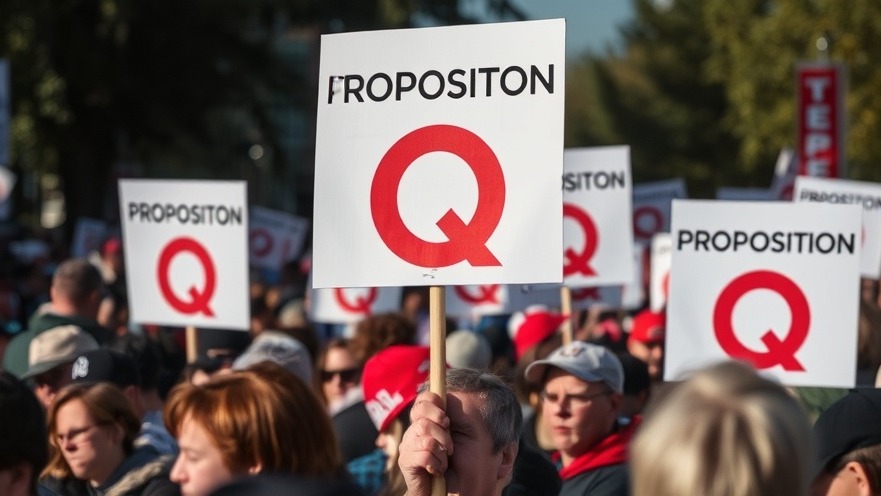
Understanding Austin's Proposition Q and Its Impact on Tax Rates
In the upcoming November election, Austin voters will face a significant decision regarding Proposition Q, a contentious tax rate increase aimed at addressing pressing municipal needs. As the city grapples with mounting challenges, including homelessness and public health, a coalition of local nonprofits, labor groups, and city council members have emerged as key supporters, contributing to the financial backing behind this measure.
What's at Stake with Proposition Q?
The proposed tax rate hike, approximately 20% higher than the previous year’s, is projected to generate an additional $110 million annually. This funding is crucial for a range of services, including essential public health initiatives, homelessness response, infrastructure maintenance, and employee compensation. For the average homeowner with a property valued at $500,000, this would translate to approximately $300 in increased property taxes, as well as additional utility charges. Understanding these implications is vital for voters as they assess how the proposed measures will impact their financial commitments and the services they rely on.
Amplifying Voices: Proponents of Proposition Q
A diverse coalition of advocacy groups is rallying support for Proposition Q. The 'Care Not Cuts Coalition,' which consists of over 30 local organizations, argues that the proposed tax increase is not just necessary, but essential for maintaining vital city programs that support vulnerable populations. Among prominent backers are organizations focused on homelessness prevention and affordable housing, such as the Ending Community Homelessness Coalition and Foundation Communities. Such groups emphasize that adequate funding is crucial for their work in helping those most affected by the city's housing crisis.
Opposition Perspective: Criticism and Concerns
While supporters paint a promising picture, not everyone is convinced that the tax hike is the right approach. Opponents, including key figures like former mayoral candidate Jeff Bowen, have raised concerns about the proposal’s long-term implications, labeling it as a 'forever tax' without clear commitments to specific funding allocations. Critics warn that the proposed ballot language could be misleading, making it difficult for voters to understand exactly how their taxes will be used. Legal challenges have arisen to contest the clarity of the ballot measure, reflecting deeper divisions in the community about fiscal responsibility and transparency.
Historical Context: The Evolution of Austin's Tax Policy
To grasp the full impact of Proposition Q, one must consider the historical context of Austin’s tax policy. In 2019, Texas lawmakers instituted limits on how much cities can increase property taxes annually without voter approval, which complicates local governance and budgeting significantly. This context not only sheds light on current tensions but also raises questions about the sustainability of municipal funding in an evolving urban landscape.
Future Implications and Community Response
The passage or failure of Proposition Q could set a precedent impacting future tax measures in Austin. Should it fail, local leaders anticipate severe budget cuts that would affect essential services across the board, particularly those that impact public health and safety. The ongoing discussions around Proposition Q underscore a broader debate about the role of government in addressing social needs versus individual financial burdens, an issue that resonates deeply with constituents.
Austin's Community and Voter Engagement
The looming election has also sparked heightened engagement among Austin residents. Through various forms of grassroots advocacy, voters are becoming increasingly vocal about their priorities. As community members weigh their opinions on Proposition Q, it is essential for them to consider not only the immediate financial implications but also the long-term benefits or detriments to the city’s operational capacity.
Actionable Insights for Austin Voters
As November 5 approaches, ensuring that your voice is heard is imperative. Voters should prioritize engaging with their council representatives, attending town hall meetings, and discussing the impacts of Proposition Q with neighbors. Understanding how elected officials plan to utilize taxpayer dollars will empower the community to make informed decisions that reflect their needs and values.
Conclusion: Why Your Vote Matters
The discussion surrounding Proposition Q exemplifies the challenges many cities face in balancing fiscal responsibility with social obligation. As Austin navigates this critical decision, citizens must acknowledge the importance of their votes in shaping the city's future. Engaging actively with local democracy not only influences immediate outcomes but also defines the trajectory of community services and support for years to come. Make your voice heard this election season—your understanding and participation can drive the change Austin needs.
 Add Element
Add Element  Add Row
Add Row 



Write A Comment